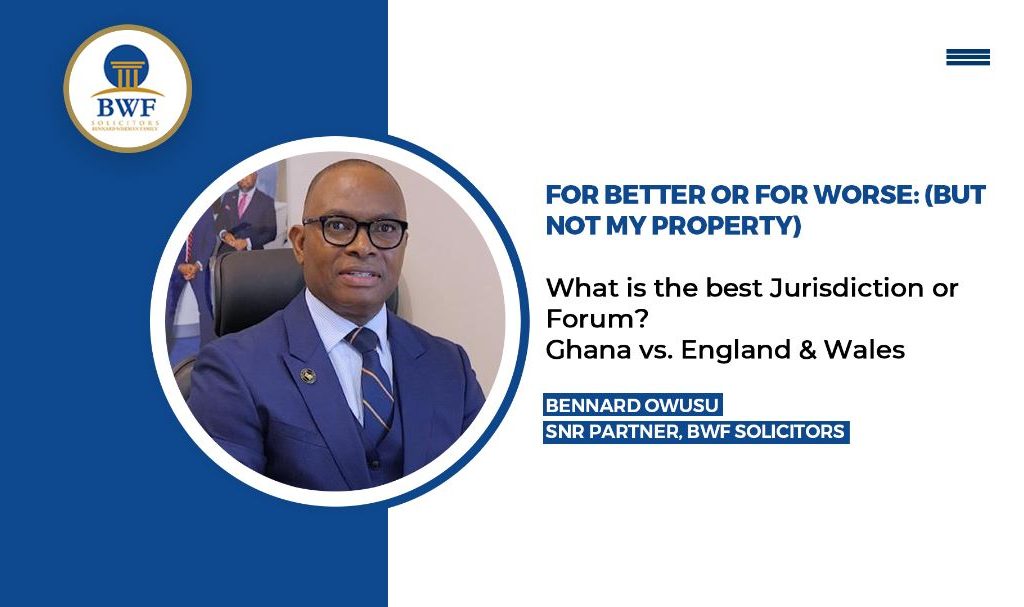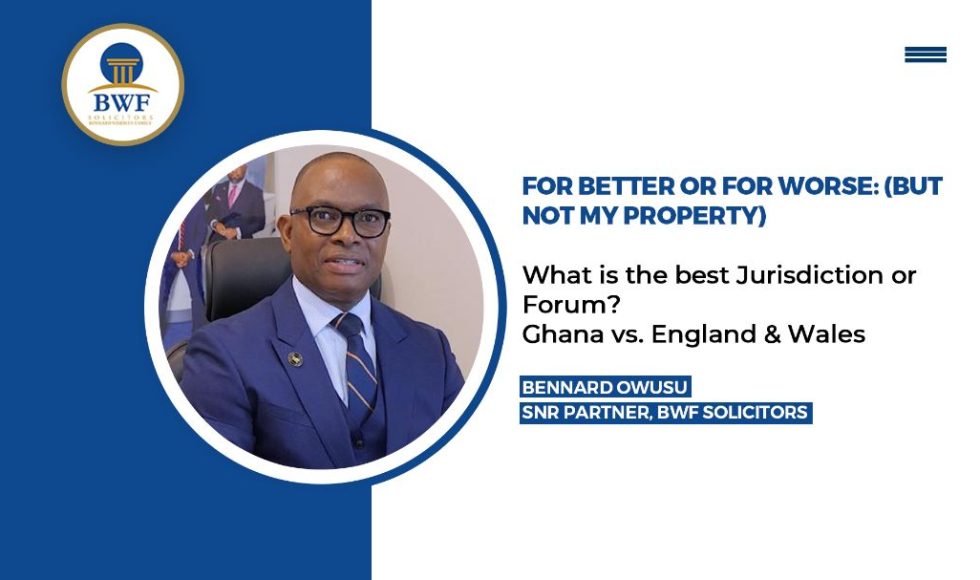FOR BETTER OR FOR WORSE: (BUT NOT MY PROPERTY)
What is the best Jurisdiction or Forum?
Ghana vs. England & Wales
Divorcing couples who have dual residence/domicile, or who live or work in different countries, may have a choice as to where they settle their divorce and financial arrangements. This is what is commonly called a choice of jurisdiction or forum, or something negatively called forum shopping.
Forum shopping is usually pursued to find the most favourable jurisdiction with the best outcomes for financial settlement post-divorce.
This short article looks at the position in England & Wales versus Ghana.
In England & Wales, on a divorce, property purchased and owned by a spouse before the marriage is usually a pre-marital asset and is usually not part of the matrimonial pot, but such property may be a matrimonial asset depending upon the facts of the case. For example, where there has been a lengthy marriage, the property may have been viewed as matrimonial property, particularly where it has been the matrimonial home.
If that is the case, then it may fall to be divided between the parties on divorce in proportions depending on the circumstances. However, this does not mean that the spouse who did not purchase or own the property becomes, by virtue of the marriage, an owner of it in equity, although that spouse may well have acquired what are known as home rights in it if it was the shared matrimonial home (giving the right to live there until the divorce is finalised).
The case of White v. White [2001] AC 596, starting with the immortal words “Divorce creates many problems”, aimed to equalise any perceived unfairness in the division of marital assets on divorce. Lord Nicholls said that “in seeking a fair outcome, there is no place for discrimination between husband and wife and their respective roles“. The case emphasised that where the available assets exceeded the parties’ housing and income needs, the remaining marital assets created during the marriage should be shared equally.
In the case of Miller v. Miller: McFarlane v. McFarlane [2006] UKHL 24, the Law Lord Baroness Hale canvassed “consistency and predictability” in court decisions dividing assets.
She highlighted three key factors:
“There are three stands of fairness:
- Sharing the fruits of the marital partnership
- Needs
- Compensation for a relationship-generated disadvantage”.
The principles of sharing, needs, and compensations cases gave structure to judgements and are the basis of most financial proceedings’ advice given in England & Wales today.
What are matrimonial and ‘non-matrimonial assets’?
[para 149-153] Baroness Hale drew a distinction between “family assets” and “business or investment assets”:
- Family assets: “those things which are acquired by one or other or both of the parties with the intention that there should be continuing provision for them and their children during their joint lives and used for the benefit of the family as a whole”.
- As to business or investment assets: “…If the assets are not ‘family assets’, or not generated by the joint efforts of the parties, then the duration of the marriage may justify a departure from the yardstick of equality of division.
[para 22] Lord Nicholls:
- “(1) property acquired during the marriage otherwise than by inheritance or gift, sometimes called the marital acquest but more usually the matrimonial property, and
- (2) other property. The former is the financial product of the parties’ common endeavour; the latter is not. The parties’ matrimonial home, even if this was brought into the marriage at the outset by one of the parties, usually has a central place in any marriage. So it should normally be treated as matrimonial property for this purpose…
The current English law position was captured by Mrs. Justice Roberts, who summarised the relevant principles when it comes to ‘sharing’ non-matrimonial assets in WX v. HX (Treatment of Matrimonial and Non-Matrimonial Property) [2021]. EWHC 241
Mostyn J said in S v. AG [2011] EWHC 2637
“Therefore, the law is now reasonably clear. In the application of the sharing principle (as opposed to the needs principle), matrimonial property will normally be divided equally. By contrast, it will be a rare case where the sharing principle will lead to any distribution to the claimant of non- matrimonial property. Of course, an award from non-matrimonial property to meet needs is commonplace, but as Wilson LJ has pointed out, we await the first decision where the sharing principle has led to an award from non-matrimonial property in excess of needs.”
The position in Ghana is somewhat like the English law position, although not quite alike. The current position has taken the boldness of the Supreme Court to move the status to the 21st Century.
Article 22 (3)
(a) Spouses shall have equal access to property jointly acquired during marriage.
(b) Assets that are jointly acquired during marriage shall be distributed equitably between the spouses upon dissolution of the marriage.
The position at customary law was stated by Ollenu J. (as he then was) in Quartey v. Martey & Anor (1959) GLR 378 as, “that by customary law it is the duty of a man’s wife and children to assist him in the carrying out of the duties of his station in life. The proceeds of that joint effort, and any property which the man acquires with such proceeds, are by customary law the individual property of the man, not the joint property of all”.
In Yeboah v. Yeboah (1974) 2 GLR 115, Hayfron-Benjamin J. stated the principle of substantial contribution and held as follows: “although customary law did not encourage joint ownership between persons who were not connected by blood, there was, however, no positive rule of customary law that prohibited the creation of a joint interest in property between a person not connected by blood.
Caselaw then advanced the law, starting with the case of Anang v. Tagoe (1989-1990), Brobbey J. held as follows: “Where a wife made contributions towards the requirements of a matrimonial home in the belief the contribution was to assist in the joint acquisition of property, the court of equity would take steps to ensure that belief materialised.” That will prevent husbands from unjustly enriching themselves at the expense of innocent lives, particularly where there is evidence of some agreement for the joint acquisition of property”.
The court’s boldness grew by introducing fairness using equity as a principle in property distribution after the dissolution of the marriage.
Then came the Supreme Court case of Quartson v. Quartson (2010–2012) Ghana Law Report, which held “that the position of the law previously was that, where a spouse made a substantial financial contribution to the acquisition of the property pursuant to an agreement or inferred intention by the couple that the property acquired should be owned jointly, the court would hold the property to be jointly owned and would not deny one spouse ownership of the property over the other. What amounted to a substantial contribution by a spouse was usually gleaned from the facts of each case, and the courts, in their discretion, determined in what proportion the joint property would be shared. That was without prejudice to the fact that there might not have been any hard evidence of the exact amount of financial contribution made or in which mathematical proportions the contributions were made. However, the Supreme Court subsequently held the “equality is equity” principle, which enjoyed constitutional backing from Article 22 (3) of the 1992 Constitution, to be the preferred principle to be applied in the sharing of joint property. It was therefore evident that the framers of the 1992 Constitution intended that there should be no discrimination, particularly against women, in the sharing of joint property”.
The Supreme Court in the celebrated case of Gladys Mensah v. Stephen Mensah (2012) unanimously held that “it was quite clear that the provisions in Article 22 (3) (a) and (b) of the 1992 Constitution had espoused the principle of having equal access to property jointly acquired during the marriage and that of equitable distribution of such property upon divorce“.
The advice, therefore, is for couples to understand that properties acquired during the marriage shall be considered joint properties unless there are extraneous factors that determine otherwise. Even then, the courts always have discretion.
It follows that any property acquired by any spouse during the marriage can be deemed ‘jointly acquired’ property to be distributed fairly and equitably.
However, where a spouse is able to show the contrary, as was the case in Fynn v. Fynn, the presumption of “jointly acquired” may fall away. It is all a matter of evidence.
It was this confusion that prompted the Court in the second Mensah case, per Dotse, JSC, to introduce the ‘presumptive ownership’ principle, which was affirmed and became rooted in Arthur v. Arthur.
With the decisions in the Mensah No. 2, Quartson, and Arthur cases, it was no longer essential for a spouse to prove a direct financial contribution in any form to the acquisition of marital property to qualify for a share. It was sufficient if the property was acquired during the subsistence of the marriage.
Where such evidence exists, it is necessary that a spouse relying on that contribution produce evidence to determine their share in the property that was acquired on the equity principle.
In the latest case of Anyetei v. Anyetei (2023) Supreme Court, the wife’s case was that notwithstanding the registered ownership of the properties in her husband’s name, all of them were jointly acquired by her and her husband.
The Supreme Court held that, in some circumstances, equitable distribution may lead to 50-50 distribution, but not in all cases. The court obviously has discretion in these matters, and their decision is informed by the evidence and equitable fairness (equitably and not equally).
Conclusion
In conclusion, parties to the marriage can agree in advance on property settlement before initiating divorce proceedings. However, in a contentious divorce proceeding where the distribution of the acquired properties becomes a significant factor, the courts shall regard equality as an equity principle. The principle of equality and equity is the preferred principle to be applied in distributing properties after divorce. It has support in both substantive law and case law. The status quo is that any case concerning property settlement after divorce in Ghana will be heard with this guiding principle in mind. The courts still retain their discretionary powers in considering matters before them on a case-by-case basis.
Rightly or wrongly, the English legal system is viewed as the most generous to wives. Very often, the country where one or other spouse first lodges a divorce petition is ‘seized, and financial matters have to be dealt with in that country. Therefore, one can often find oneself in a ‘jurisdictional race’ to start divorce proceedings in the country which is most favourable to your client. This is a complex area of law, and it is essential to get specialist legal advice early on.
Bennard Owusu is an accredited member of the Law Society Family Law Accreditation Scheme and a member of the Ghana Bar Association. Family Law Accreditation is a recognised quality standard for family law practitioners in the U.K.








